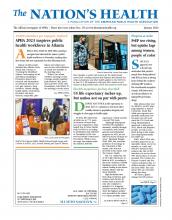
Most college students who are food insecure suffer moderate to serious sleep deprivation and stress, a new study says.
Photo by Bo1982, courtesy iStockphoto
Nearly 40% of U.S.college students lack consistent access to food, known as “food insecurity,” putting them at risk for sleep problems and psychological distress, according to new research.
Presented at APHA’s Annual Meeting and Expo in November, the study examined 2019-2022data on more than330,000 students from the National College Health Assessment.
Of the students who were food insecure, more than 70% said they experienced moderate to serious psychological distress. That distress carried over into their sleep: Forty percent reported moderate sleep challenges, and 31% reported major sleep challenges.
The American Academy of Sleep Medicine recommends at least seven hours of sleep a night for adults, but 43% of college students reported getting less than seven hours a night.
“Sleep health is a major indicator of a lot of our public health outcomes,” said presenter Adam Hege, PhD, MA, an associate professor of public health and undergraduate program director at Appalachian State University and APHA member. “Sleep has been shown to be associated with many of our chronic health conditions, having physiological impacts, mental health impacts.”
College and university students have faced both long-time and new challenges in recent years, including rising costs of college education and the COVID-19 pandemic.
“Being food insecure led to increased odds of poor sleep or lower sleep duration,” Hege said.
Hege said it is vital that policymakers and university officials address the social conditions and determinants of sleep.
“We need to go further when it comes to policy going much more upstream as we promote public health,” he said.
Findings released by the National Center for Education Statistics in July showed that food insecurity is higher among undergraduate students than graduate students. Students at for-profit colleges are at highest risk. Nationally, 12.8% of U.S. households were food insecure in 2022, according to the U.S. Department of Agriculture, translating to 17 million households.
Another study by researchers at Appalachian State University found that almost one-third of undergraduate college students were at risk for suicide during the early years of the COVID-19 pandemic.
Students who were older, non-binary, white or who were not heterosexual faced increased risk of suicide in 2021, according to the research, which also used data from the National College Health Assessment.
Social connectedness among students helped lower suicide risk, the researchers noted.
A version of this story was published on APHA’s Annual Meeting Blog
- Copyright The Nation’s Health, American Public Health Association









